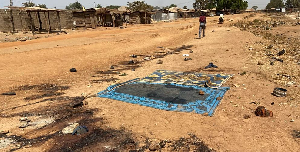Accra, Dec. 10, GNA - Ms. Anna Bossman, Acting Commissioner of the Commission on Human Rights and Administrative Justice (CHRAJ), on Monday reminded government that its commitment to development and poverty alleviation must not be measured merely on the basis of macro-economic indicators and physical infrastructure such as roads, bridges and industries.
Rather, she said, they ought to be seen in terms of the full realization of the fundamental human rights of all the citizenry, one in which significant numbers of its vulnerable population enjoyed their right to food, basic primary health care, shelter and housing and the right to the most basic forms of education.
Ms. Bossman gave the reminder when she gave highlights of this year's Report on the State of Human Rights in Ghana on the occasion of International Human Rights Day which falls on Monday.
The occasion which also witnessed the reading of the United Nations Secretary-General's message to mark the day, formed part of activities lined up by CHRAJ for Human Rights Week celebration under the theme: "Human Rights and Social Justice in Ghana@50. Have We Come Of Age?" The Acting Commissioner urged government to empower and fully support human right institutions to enable them to deliver on the aspirations of the people.
"No government can be truly democratic or claim to be promoting good government if it fails to recognize the link between human rights and sustainable development, human rights and poverty alleviation and eradication, and if it fails to understand the impact of corruption on human rights."
While commending the efforts of government for ratifying core human rights instruments, Ms Bossman urged it to demonstrate its full commitment to the plight of vulnerable persons and detainees.
She therefore called for the immediate ratification of International Human Rights Instruments, such as "The Optional Protocol to the Convention Against Torture" which provides for concrete steps to prevent violations from occurring within places of detention; "The United Nations Convention on the Rights of Persons with Disabilities" the first human rights convention of this century and designed to encourage governments to eliminate discriminatory laws and practices against persons with disabilities; and "The ILO Convention 138" which is a comprehensive convention on child labour.
Turning to the political scene, Ms. Bossman reminded the electorate that as we entered the election year, they should make wise decisions that would determine the nation's direction in the promotion of the rule of law and good governance, instead of allowing politicians to bombard them on all sides, promising "the moon, the stars, and a bit of cheese". She said as the nation stood at the threshold of the election year, Ghanaians should be reminded that the nation could only make meaningful achievements to development, growth and poverty reduction, if significant numbers of the people did not suffer deprivation of their basic social and economic needs.
Ms Bossman expressed regret that caning as a form of corporal punishment still existed in some schools, and said the practice was unacceptable, and must therefore cease forthwith.
On the passage of the Domestic Violence Law last February, the Acting Commissioner lauded government for its efforts, but noted with dismay that domestic violence against women and girls in the form of rape, defilement and wife battering, still remained a problem. Quoting statistics to buttress her point, Ms Bossman said figures from the Domestic Violence and Victim Support Unit of the Ghana Police Service indicated that a total of 11,298 cases were reported between January and September this year, out of which 20 per cent represented rape and 68 per cent defilement.
She urged victims as well as witnesses to report cases of violence against women to the police for prosecution and not to remain silent as violence adversely impacted on the physical and psychological development of victims.
The Acting Commissioner commended the media for the effective role in highlighting and bringing to the fore human rights issues, and urged journalists not to be complacent but continue to be at the forefront of the fight against all forms of human rights abuses in society. In his message to commemorate Human Rights Day which was read for him, the UN Secretary-General launched a year-long commemoration of the 60th anniversary of the Universal Declaration of Human Rights, and regretted that the fundamental freedoms enshrined in it were still not a reality for everyone.
Mr. Ban Ki-Moon pointed out that too often, governments lacked the political will to implement international norms they had willingly ratified and accepted.
"This anniversary year is an occasion to build up that will. It is a chance to ensure that these rights are a living reality - that they are known, understood and enjoyed by everyone, everywhere. It is often those who most need their human rights protected, who also need to be informed that the Declaration exists-and that it exists for them," Mr Ban said.
General News of Monday, 10 December 2007
Source: GNA












